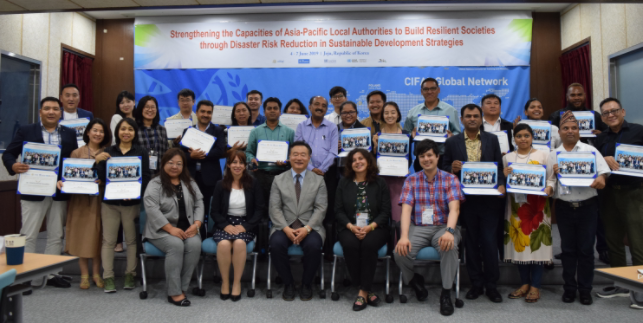
DPIDG, through its Project Office on Governance (UNPOG), co-organized a four-day training workshop with UNDRR and UNITAR on "Strengthening the Capacities of Asia-Pacific Local Authorities to Build Resilient Societies through Disaster Risk Reduction in Sustainable Development Strategies" from 4-7 June 2019 in Jeju, Republic of Korea. 25 participants attended the workshop and are primarily from local governments in target countries such as Lao PDR, Bangladesh, Philippines, Solomon Islands and Nepal. National government representatives from Ministries of Environment and Planning also participated as well as three civil society representatives, such as the Pacific Islands Private Sector Organisation (PIPSO).
The workshop focused on strengthening policy coherence between national to local implementation of the SDGs and the Sendai Framework for Disaster Risk Reduction to further underscore that these agendas were integrated and self-reinforcing as well. Country representatives, such as from the NEDA – the SDG focal point of the Philippines, noted one of key challenges they face was the need to align a variety of national planning and development strategies with a web of similar development strategies at provincial and local levels, where these strategies all need to be coordinated and made coherent to integrate resilience and SDGs from national to local levels.
Participants also highlighted the importance of better targeting and engaging vulnerable groups in resilience and sustainable development efforts, where women were identified as the most vulnerable group in disaster contexts. For example - Nepal noted that "Women are the most vulnerable group, especially to natural disasters. Women have very limited access to assets - physical, technological, financial capital such as land credits, decision-making bodies, technology, agriculture inputs...". The training included a special session on better engaging stakeholders such as Women for more inclusive SDG implementation and services delivery, especially in disaster planning and response contexts.
Dynamic exercises, group dialogue, and working group sessions were organized to strengthen practical learning and shape participant mindsets on coordination, communication and collaboration. Concepts such as risk-informed, evidence-based and data-driven planning and policymaking were especially reinforced. The organizers look forward to replicating the training through future events and activities.
Read more (URL : http://unpog.org/page/sub3_1_view.asp?sn=315&page=3&search=&SearchString=&BoardID=0002)
 Bienvenue aux Nations Unies
Bienvenue aux Nations Unies